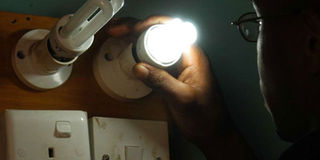ERC responds to complaints of overbilling electricity users

Lights on. Electricity consumers have complained of inflated bills. PHOTO | JOSEPH KANYI | NATION MEDIA GROUP
What you need to know:
- Kenya Power charges customers for electricity bills based on tariffs set by the Energy Regulatory Commission.
- The ERC usually obtains actual data on the variable components of electricity generation, transmission and distribution.
The Energy Regulatory Commission (ERC) on Monday explained how the billing process functions.
In response to a case filed by lawyer Apollo Mboya, the ERC said the current tariff setting process has been in operation for the last 10 years and "has worked well without any complaints of overbilling or back billing".
Through Beatrice Meso, the firm's secretary, the ERC denied claims of overcharging customers.
Ms Meso said Kenya Power charges customers for electricity bills based on tariffs set by it.
TARIFFS
She explained that an electricity bill includes the price, rate, cost and adjustments payable for electricity supplied by an electricity energy distributor.
She added that the billing is done by Kenya Power based on a supply contract between the distributor and consumer.
"When setting the tariffs, a set of costs incurred in power generation, transmission, distribution and retailing can be determined with fair accuracy whereas a certain group of costs depend on a number of other variables and cannot be determined with precision," she said in a sworn statement.
And to overcome the challenge in setting tariffs, Ms Meso said a number of components are fixed while others will fluctuate or be adjusted in line with prevailing circumstances such as price of fuel, inflation rates and foreign exchange fluctuations, among others.
ANNUAL REPORT
As a way of regulating the charges consumers incur, the ERC usually obtains actual data on the variable components of electricity generation, transmission and distribution.
She said the data is utilized to ascertain and compute the actual fuel cost that Kenya Power can recover through billing; and it is in line with the reasonable and just objective of the ERC as stipulated in section 6 (1) of the Energy Act.
"After ascertainment of the actual amount that can be passed to the consumer, the figures/rates are published in the Kenya gazette. KPLC is required to apply the approved and gazette rates in its billing," she said.
Mr Mboya sued Kenya Power in January accusing it of overbilling customers to recover Sh10.1 billion contained in the company’s Annual Report and Financial Statements of last year.
CONSUMERS
Mr Mboya said that since October 2017, several consumers begun receiving inflated power bills and the company allegedly admitted that it has so far recovered Sh2.1 billion from consumers incurred on diesel generation last year; and which was not factored in the monthly electricity bills sent to the consumers.
"I received over 600 hundred emails with complaints that can be classified into broad categories as follows: overbilling, reduction in units, malfunctioning equipment, quality of electricity, bill adjustments, unexplained and fluctuating tariffs, standard charges exceeding value of actual electricity and standing amounts deducted from some accounts," he said in a sworn statement.
Kenya Power's lawyer Kiragu Kimani asked for more time to file additional papers, which Justice Chacha Mwita allowed.
The hearing will continue on October 9.




